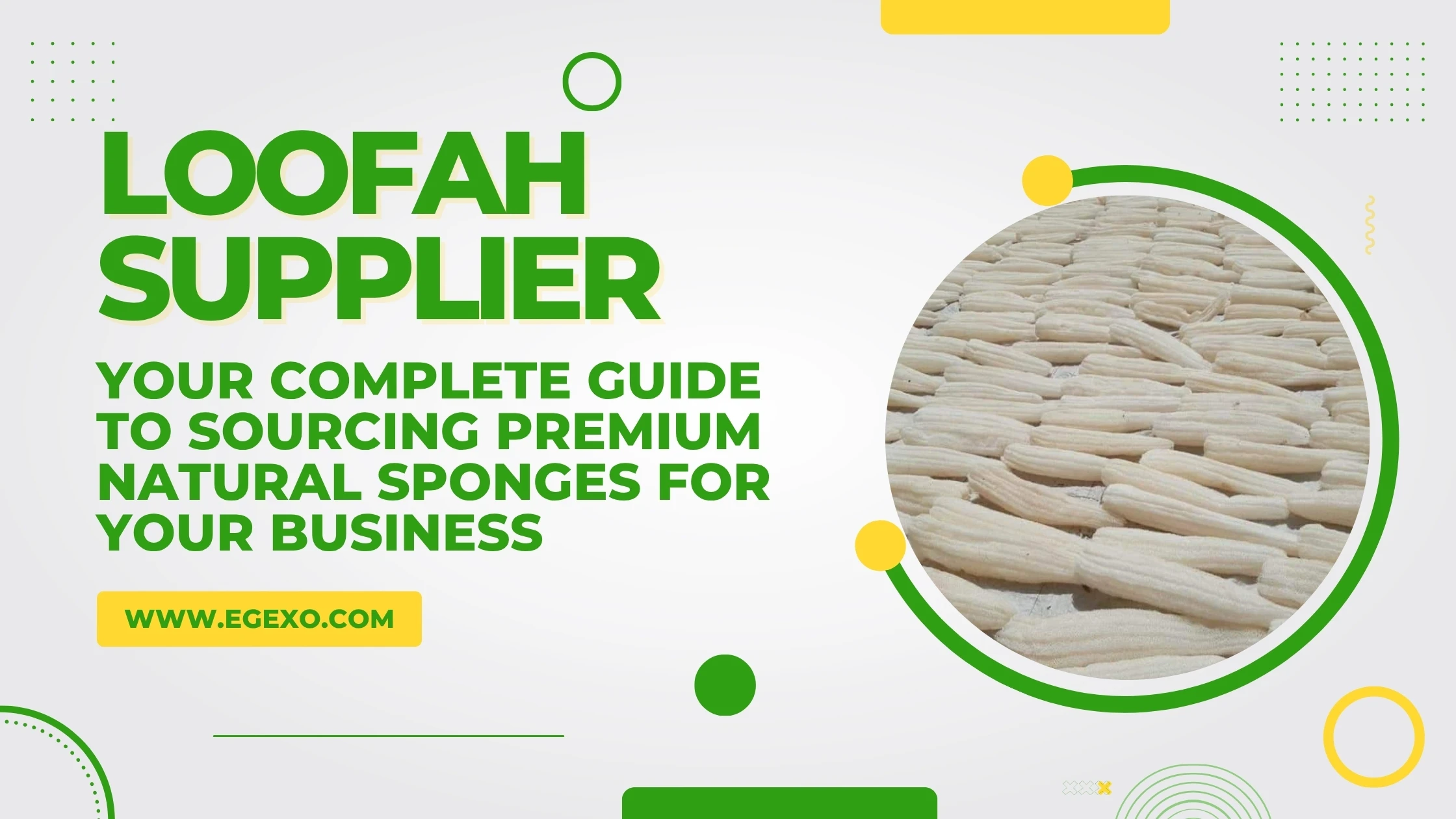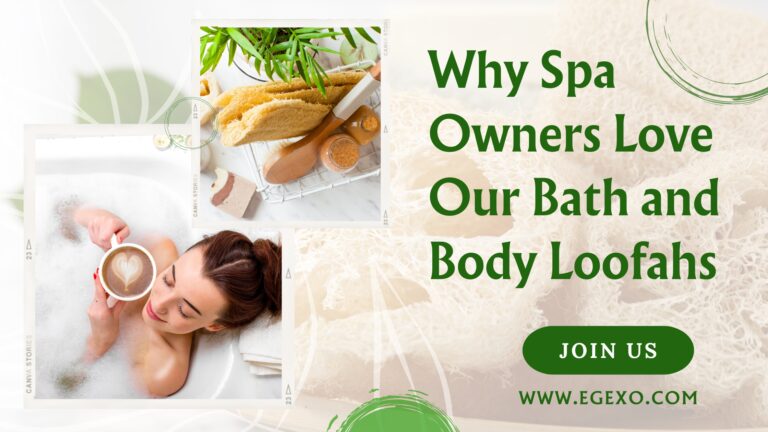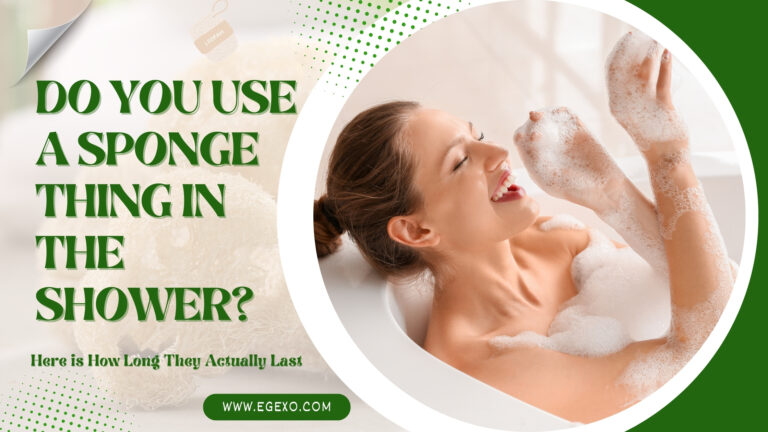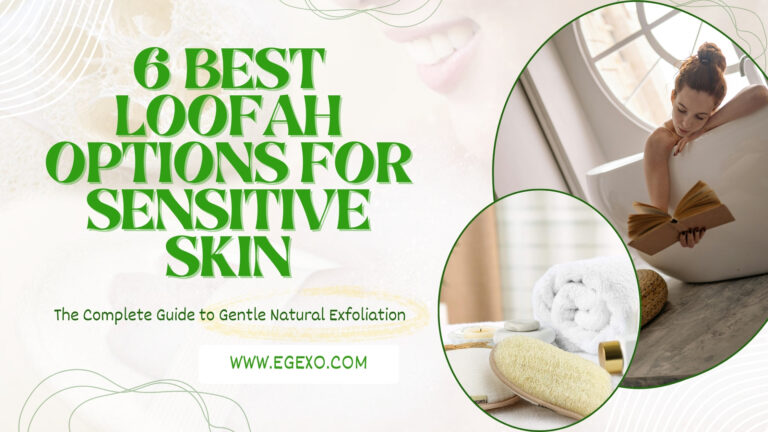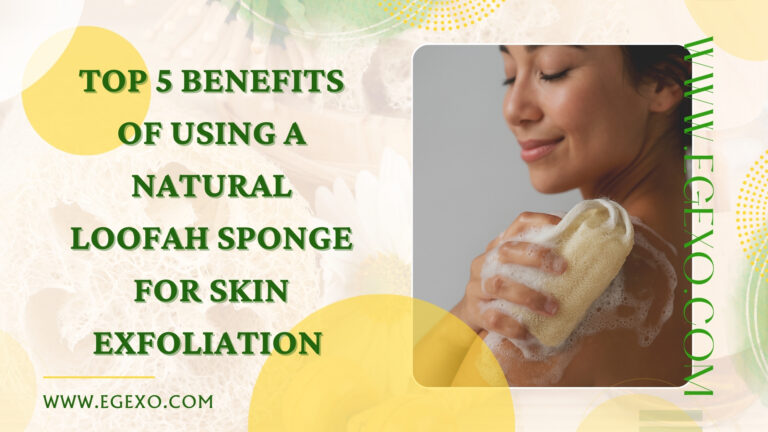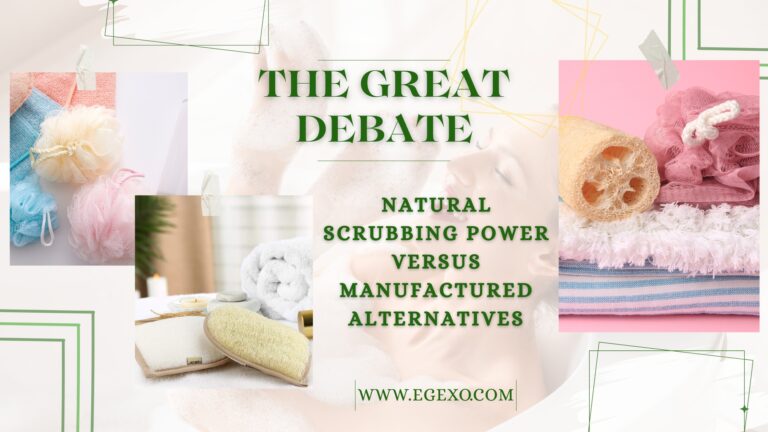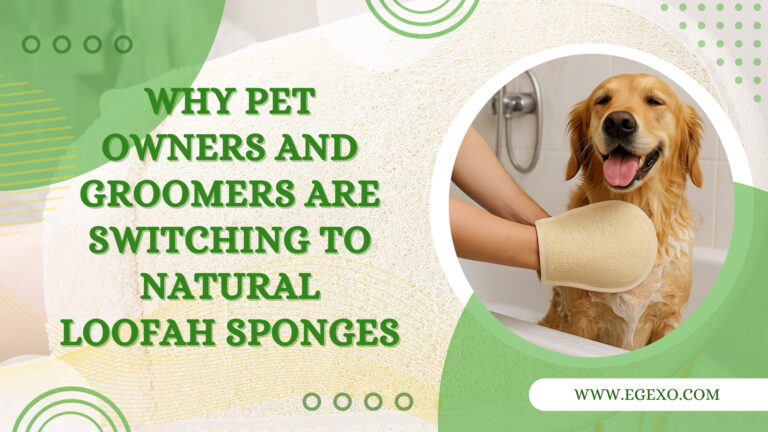Loofah Supplier: Your Complete Guide to Sourcing Premium Natural Sponges for Your Business
Starting a business in the bath and body industry or expanding your existing product line? You have stumbled upon one of nature’s most versatile and profitable products: the natural loofah sponge. As consumer preferences shift dramatically toward eco-friendly alternatives, the demand for natural cleaning and exfoliating solutions has never been higher. Finding the right loofah supplier is not just about purchasing inventory. It is about partnering with someone who understands quality, sustainability, and the nuances of this remarkable natural product.
I remember the first time I held an authentic Egyptian loofah. The texture, the quality, the natural integrity of the fibers felt completely different from the synthetic alternatives flooding the market. That moment sparked a deeper understanding of why sourcing matters so profoundly in this industry.
What Makes a Great Loofah Supplier?
Choosing a loofah supplier goes far beyond comparing price sheets. The right partner impacts everything from your product quality to your brand reputation and ultimately your bottom line. A great supplier brings expertise that spans cultivation, harvesting, processing, and international shipping logistics.
The best suppliers control their supply chain from farm to export. This vertical integration ensures consistent quality and allows for better pricing structures. When evaluating potential partners, look for suppliers who can articulate their growing methods, explain their quality control processes, and demonstrate a track record of reliable deliveries.
Natural loofah remains the superior choice compared to synthetic alternatives. Unlike plastic-based sponges that contribute to microplastic pollution and end up in landfills for centuries, natural luffa sponges are completely biodegradable. They break down naturally within weeks when composted, leaving no harmful residue. This environmental profile resonates deeply with today’s conscious consumers and gives retailers a powerful marketing advantage.
Why Egyptian Loofah Stands Above the Rest
Not all natural loofahs carry the same quality standards. Egyptian loofah has earned its reputation as the gold standard in the industry for compelling reasons rooted in geography, climate, and centuries of agricultural expertise.
Egypt’s Nile Delta provides ideal growing conditions. The combination of rich alluvial soil, consistent sunshine, and controlled irrigation creates loofah plants with denser fiber networks and more durable structures. The result? Sponges that last longer, maintain their shape better, and provide superior exfoliation without falling apart after a few uses.
Traditional Egyptian farmers have cultivated loofah for generations. This accumulated knowledge translates into superior harvesting timing, optimal drying techniques, and better post-harvest processing. When you source Egyptian loofah, you benefit from this inherited wisdom combined with modern quality standards.
Compare an Egyptian loofah sponge to alternatives from other regions, and you will notice the difference immediately. The fiber density feels more substantial. The color appears more uniform. The durability withstands repeated use without deteriorating. These tangible differences matter tremendously to end consumers and directly impact your return customer rate.
Understanding Your Loofah Product Options
The versatility of natural loofah allows suppliers to offer diverse product categories, each serving specific market niches. Smart retailers recognize these distinctions and curate their inventory accordingly.
Bath and Body Applications
Bath and body loofah products represent the most recognized use case. From exfoliating back scrubbers to gentle facial rounds, this category appeals to consumers prioritizing skin care and natural beauty routines. The natural texture provides mechanical exfoliation that removes dead skin cells without harsh chemicals, making it ideal for sensitive skin types.
Back strap designs with handles solve a common consumer problem while commanding premium pricing. Body mitts and gloves offer controlled exfoliation for targeted areas. Round facial pads provide gentle daily cleansing. Each variation addresses specific customer needs and opens distinct market segments.
Kitchen and Household Solutions
Kitchen and household loofah products tap into the growing movement away from plastic dish sponges. Natural loofah scrubbers clean dishes effectively without scratching delicate surfaces. They resist bacterial growth better than synthetic alternatives when properly dried between uses. They replace wasteful disposable sponges with a sustainable option that lasts months.
Consumers increasingly recognize that their cleaning supplies should not contradict their environmental values. A plastic sponge that helps clean their home while polluting the planet creates cognitive dissonance. Natural loofah resolves this tension beautifully, offering effective cleaning power with complete biodegradability.
Raw Loofah Opportunities
Raw loofah scrubbers appeal to craft businesses, DIY enthusiasts, and brands creating custom formulations. These unprocessed forms allow maximum creative flexibility. Soap makers embed loofah pieces into their bars. Craft businesses slice and shape them into unique designs. Creative entrepreneurs develop entirely new product categories we have not yet imagined.
The raw material approach also enables competitive pricing strategies. By processing products yourself or offering customization services, you create additional value and differentiate from competitors selling standard finished goods.
Pet and Spa Grooming Applications
Loofah pet and spa grooming products represent an often-overlooked growth category. Pet owners seek natural grooming solutions free from synthetic materials their animals might ingest. Spa professionals appreciate tools that enhance their natural treatment philosophies.
Dog grooming mitts with loofah provide gentle exfoliation during bathing. Spa treatment tools add natural texture to professional services. Pet toy variations combine play with dental health benefits. These specialized applications often command premium pricing while serving dedicated niche markets.
How to Evaluate Loofah Quality Standards
Quality assessment separates successful retailers from those struggling with returns and disappointed customers. Understanding what defines premium loofah helps you evaluate suppliers accurately and set appropriate product pricing.
Fiber density impacts durability dramatically. High-quality natural loofah features tightly woven fibers that maintain structural integrity through dozens of uses. Lower grades show gaps, weak spots, and irregular fiber distribution that lead to premature breakdown.
Color uniformity indicates proper harvesting and processing. Premium Egyptian loofah displays consistent cream to light tan coloring throughout. Irregular dark spots, green tinges, or widely varying colors within a batch suggest rushed harvesting or inadequate processing.
Texture consistency matters for end-user satisfaction. Quality loofah provides firm but yielding resistance. It should never feel brittle, which indicates over-drying, or mushy, which suggests inadequate drying or age-related deterioration.
A reliable loofah quality standards framework helps you communicate requirements clearly to suppliers and evaluate incoming shipments objectively. Establishing grade definitions before placing orders prevents misunderstandings and returns.
The Journey From Farm to Your Warehouse
Understanding the farm to export process provides insight into what separates professional suppliers from opportunistic intermediaries. This knowledge helps you ask informed questions and evaluate supplier capabilities accurately.
Loofah cultivation begins with selecting proper varieties suited to regional conditions. Planting occurs after the last frost, with vines trained on support structures as they grow. The plants require consistent watering and nutrient management throughout their development cycle.
Harvesting timing critically impacts final product quality. Mature loofah feels lightweight and produces a rattling sound when shaken, indicating the seeds have dried inside. Premature harvesting yields weak, thin-walled sponges. Delayed harvesting risks weather damage and decomposition.
Post-harvest processing involves soaking to loosen the outer skin, peeling away the green exterior, removing seeds, and thorough drying. This labor-intensive work requires skill and attention to detail. Shortcuts during processing show up as quality defects in the finished product.
Proper suppliers control or closely monitor each step. They work directly with farmers using consistent practices. They process using proven methods that preserve fiber integrity. They inspect and grade products before packing. This comprehensive approach ensures the natural loofah reaching your warehouse meets your specifications consistently.
Building Your Brand Through Customization
Generic products compete primarily on price, a race to the bottom that benefits no one except consumers seeking the cheapest option. Smart businesses differentiate through branding, packaging, and product customization that creates unique value propositions.
Private label loofah manufacturing allows you to sell products under your own brand name without investing in manufacturing infrastructure. A capable supplier handles production while you focus on marketing, sales, and customer relationships. Your brand appears on packaging, creating customer loyalty that follows your company rather than the manufacturer.
Private labeling works particularly well for businesses with established customer bases seeking to expand into complementary products. Your existing customers already trust your brand. Offering natural loofah products under that trusted name provides easier market entry than building recognition for an unknown supplier’s brand.
Custom product design services take differentiation further by creating entirely unique products. Perhaps you envision a specific shape that solves a customer problem. Maybe you want to combine loofah with other natural materials in innovative ways. Perhaps your brand aesthetic requires particular sizing, colors, or packaging approaches.
Custom development requires working with suppliers who understand product design beyond simply processing raw materials. They need creativity, technical knowledge, and willingness to experiment. The investment in custom products pays off through exclusive offerings competitors cannot replicate and premium pricing reflecting that uniqueness.
What Your Startup Business Needs to Know
Launching a business around natural loofah products offers substantial opportunities but also requires realistic planning. Understanding common pitfalls helps new entrepreneurs navigate this industry successfully.
Start with clear target market identification. Are you selling to environmentally conscious consumers through online channels? Supplying spa and salon professionals? Targeting the pet care market? Each audience requires different product selections, pricing strategies, and marketing approaches. Trying to serve everyone simultaneously dilutes your resources and confuses your messaging.
Minimum order quantities from suppliers often challenge new businesses with limited capital. Quality loofah suppliers typically require meaningful minimum orders to justify international shipping and processing costs. Plan your initial inventory investment carefully, focusing on your most promising products rather than attempting complete product line coverage immediately.
Many successful loofah businesses started by testing products through platforms like Amazon, Etsy, or local farmers markets before committing to large inventory purchases. Request loofah samples from potential suppliers to evaluate quality firsthand and test customer response before placing substantial orders.
Shipping timelines from international suppliers require planning ahead. Egyptian loofah typically ships via ocean freight, taking several weeks from order confirmation to warehouse delivery. Air freight offers faster delivery but at substantially higher costs that may not make economic sense for a starting business. Build adequate lead time into your planning to avoid stockouts.
Wholesale Pricing Strategies and Profit Margins
Understanding loofah wholesale pricing structures helps you evaluate supplier quotes accurately and set retail prices that balance competitiveness with profitability.
Volume discounts represent standard practice in the loofah industry. Suppliers offer better per-unit pricing as order quantities increase, reflecting economies of scale in processing and shipping. A small initial order might cost significantly more per piece than subsequent larger orders once you have established demand.
Product complexity impacts pricing naturally. Raw unprocessed loofah costs less than shaped and finished products. Standard items from existing production lines price lower than custom designs requiring special processing. Bulk packaging costs less than individually wrapped retail-ready units.
Seasonal factors can influence availability and pricing. Peak harvest seasons may offer better pricing and selection. Off-season ordering might face limited inventory or slightly higher costs. Establishing relationships with reliable suppliers helps smooth these seasonal variations through advance planning.
Calculate your target margins based on your full business costs, not just product acquisition. Factor in shipping to your location, storage, packaging, marketing, platform fees if selling online, and your desired profit. Natural loofah’s favorable pricing allows healthy margins while remaining competitive against synthetic alternatives.
Most retailers target 2.5 to 4 times cost markup on bath and body loofah products. Kitchen and specialty items often support even higher margins. The key is communicating value effectively so customers understand why your natural loofah sponge costs more than a cheap synthetic alternative while delivering superior performance and environmental benefits.
Why Geographic Location Matters for Your Supply Chain
Your business location influences which supply arrangements make the most sense strategically. Different regions face distinct logistics considerations when sourcing Egyptian loofah.
North American businesses, particularly in the USA and Canada, benefit from established shipping routes and customs procedures. Many suppliers offer consolidated shipping to major ports, reducing individual business shipping costs. The growing environmental consciousness in these markets creates strong demand for natural alternatives, supporting premium pricing strategies.
Australian and New Zealand businesses face longer shipping routes but serve markets with particularly strong environmental values. The geographic isolation that increases shipping costs also creates some competitive insulation from businesses importing from closer suppliers. Emphasizing the natural and sustainable aspects of Egyptian loofah resonates powerfully with consumers in these markets.
European Union markets offer sophisticated consumers willing to pay for quality and sustainability. However, import regulations and customs procedures require attention to detail. Working with suppliers experienced in EU exports helps navigate these requirements smoothly. The diverse country markets within the EU allow for interesting localization strategies based on regional preferences.
Brazilian and Latin American businesses might explore regional growing in addition to importing Egyptian varieties. However, Egyptian loofah’s quality reputation often supports premium positioning even with higher import costs. The key is targeting consumers who value quality and sustainability over simply finding the cheapest option.
Building Long-Term Supplier Relationships
The most successful businesses in the natural products industry view their suppliers as strategic partners rather than interchangeable vendors. This relationship approach creates mutual benefits that extend far beyond individual transactions.
Communication consistency builds trust over time. Regular check-ins even when not placing orders demonstrate commitment to the relationship. Sharing market feedback helps suppliers understand your customers and potentially develop products that better serve your needs.
Payment reliability matters tremendously, especially when working with international suppliers. Honoring payment terms builds confidence and often leads to more favorable terms over time. Suppliers naturally prioritize businesses that pay promptly and reliably when allocating limited inventory or prioritizing production schedules.
Reasonable expectations about lead times, customization limits, and problem resolution create sustainable partnerships. Understand that natural agricultural products face inherent variability. Weather impacts harvests. Processing faces limitations. International shipping encounters delays. Partners who understand these realities and plan accordingly build stronger relationships than those demanding impossible guarantees.
Consider visiting your supplier if feasible. Seeing operations firsthand creates understanding that transforms the business relationship. You gain insight into their capabilities and constraints. They see your commitment to the partnership. Many successful long-term relationships in the loofah industry began with an in-person visit that established personal connections beyond transactional exchanges.
Marketing Your Natural Loofah Products Effectively
Having quality products matters little without effective marketing that connects with your target audience. Natural loofah offers compelling stories that resonate with modern consumers when communicated effectively.
Sustainability messaging appeals strongly to environmentally conscious consumers. Emphasize that natural loofah completely biodegrades within weeks when composted, contrasting sharply with synthetic sponges that persist in landfills for centuries. Visual content showing the decomposition process creates powerful messaging.
The natural origin story interests consumers tired of artificial everything. Share information about how loofah grows, its agricultural heritage, and the farmers who cultivate it. This storytelling creates emotional connections beyond functional product benefits.
Skin care benefits support premium positioning for bath and body applications. Natural loofah provides mechanical exfoliation that removes dead skin cells, improves circulation, and helps skin absorb moisturizers more effectively. These benefits appeal to beauty-conscious consumers willing to invest in their skincare routines.
Multiple use cases expand your addressable market. A customer might initially purchase loofah for body exfoliation, then discover it works brilliantly for dish cleaning, then buy additional products for pet grooming. Content marketing that educates about diverse applications increases average customer value while positioning you as a knowledgeable resource.
Before and after imagery demonstrates product effectiveness visually. Skin texture improvements, cleaning results, and durability comparisons create convincing evidence that justifies premium pricing versus cheap alternatives.
Navigating Common Challenges in the Loofah Business
Every business faces obstacles. Understanding common challenges in the natural loofah industry helps you prepare appropriate responses rather than being surprised by predictable issues.
Customer education requires consistent effort. Many consumers have never used authentic natural loofah or only experienced low-quality versions. They need guidance about proper use, care, and replacement timing. Investing in educational content pays dividends through increased satisfaction and reduced returns.
Some customers initially find natural loofah too rough compared to soft synthetic sponges. This reflects unfamiliarity rather than product defects. Guidance about softening loofah with warm water before use and starting with gentle pressure helps customers adjust and appreciate the exfoliating benefits.
Seasonal demand fluctuations occur in bath and body products, with higher sales during holiday gift-giving seasons and slower periods during summer months. Planning inventory and cash flow around these predictable patterns prevents stockouts during peak periods and excessive inventory during slow months.
Competition from cheaper synthetic alternatives continues despite growing environmental consciousness. Some consumers prioritize immediate cost savings over sustainability considerations. Rather than competing on price alone, focus on serving the growing segment that values quality and environmental responsibility. These customers become loyal repeat buyers rather than perpetually seeking the cheapest option.
Quality consistency occasionally varies even with good suppliers due to the agricultural nature of the product. Establishing clear quality standards and inspection procedures helps catch issues before they reach customers. Building relationships with suppliers who stand behind their products and address concerns responsibly matters tremendously.
How to Scale Your Loofah Business Successfully
Starting small and growing gradually works well in the natural products industry. Understanding scaling strategies helps you expand sustainably without overextending resources or compromising quality.
Product line expansion should follow customer demand signals rather than arbitrary decisions. Pay attention to which products sell best, what customers request, and where market gaps exist. Let actual market response guide your expansion rather than assumptions about what should work.
Geographic expansion opens new markets once you have refined operations in your initial territory. Test new regions cautiously, understanding that preferences and price sensitivity may vary. What works brilliantly in California might need adjustment for Texas, and vice versa.
Wholesale accounts with retail stores, spas, or other businesses multiply your reach beyond direct consumer sales. These partnerships require different pricing structures, payment terms, and support compared to retail customers. Many successful loofah businesses eventually derive most revenue from wholesale accounts after establishing their brand through direct sales.
Explore available products and options to understand the breadth of possibilities as you scale. Your initial product selection might focus narrowly, but understanding the full range helps you identify natural expansion opportunities.
Additional sales channels diversify risk and expand reach. A business starting on Etsy might expand to Amazon, then add a branded website, then pursue retail partnerships. Each channel requires adaptation but reduces dependence on any single platform.
The Environmental Impact Story Customers Care About
Modern consumers increasingly make purchasing decisions based on environmental considerations. The natural loofah story offers compelling sustainability benefits that differentiate your products powerfully.
Plastic pollution has reached crisis levels in our oceans and ecosystems. Synthetic sponges contribute to this problem throughout their lifecycle. Production consumes petroleum and releases greenhouse gases. Use sheds microplastic particles that enter water systems. Disposal adds to landfill waste that persists for centuries. This environmental cost increasingly concerns consumers seeking alternatives.
Natural loofah represents a truly circular solution. It grows using solar energy, water, and nutrients. Cultivation actually benefits the environment by converting CO2 to oxygen like any plant. Processing requires minimal energy compared to synthetic manufacturing. Use releases no harmful particles. Disposal through composting returns nutrients to soil, completing a natural cycle.
This complete lifecycle sustainability story resonates powerfully when communicated effectively. Create content showing the full journey from plant to product to compost. Visual storytelling through images and video makes abstract environmental benefits tangible and compelling.
Certifications and third-party validation strengthen environmental claims. While natural loofah is inherently sustainable, certifications like organic growing or fair trade practices add credibility and appeal to consumers seeking verification of sustainability claims.
FAQ: Your Loofah Supplier Questions Answered
What minimum order quantity should I expect from a loofah supplier?
Most professional loofah suppliers require minimum orders ranging from 500 to 2,000 pieces depending on the product complexity and customization level. Standard items typically have lower minimums than custom products. These minimums reflect the economics of international shipping and processing. For businesses just starting, many suppliers offer sample orders at higher per-unit costs to allow testing before committing to full production minimums.
How long does shipping typically take from Egyptian loofah suppliers?
Ocean freight from Egypt typically requires 3 to 6 weeks from order confirmation to delivery at your warehouse, depending on your location and current shipping conditions. This includes processing time, transport to port, sea transit, customs clearance, and final delivery. Air freight reduces transit to 7 to 10 days but costs significantly more. Plan your inventory needs well in advance to avoid stockouts while keeping carrying costs reasonable.
What makes Egyptian loofah superior to other origins?
Egyptian loofah benefits from ideal growing conditions in the Nile Delta region, including rich soil, consistent sunshine, and controlled irrigation. Centuries of cultivation expertise result in superior harvesting timing and processing techniques. The combination produces denser fiber structures, more uniform quality, and greater durability compared to loofah from other regions. These tangible quality differences matter to end consumers and justify premium positioning.
Can natural loofah harbor bacteria and become unsanitary?
Natural loofah resists bacterial growth better than synthetic sponges when properly cared for. The key is allowing complete drying between uses. Rinse thoroughly after each use, squeeze out excess water, and store in a ventilated location where air can circulate freely. The natural fibers dry quickly compared to synthetic materials, and the antimicrobial properties of the plant material inhibit bacterial colonization. Replace loofahs every 3 to 4 weeks with regular use to maintain optimal hygiene.
What profit margins can I expect selling natural loofah products?
Retail markups typically range from 2.5 to 4 times wholesale cost for bath and body loofah products. Specialty items like custom designs or unique applications often support even higher margins. Wholesale businesses selling to retailers typically work with smaller margins around 40 to 60 percent but benefit from larger volume orders. Your specific margins depend on your market positioning, sales channels, operational efficiency, and value-added services like branding or custom packaging.
Should I offer private label or sell under the supplier’s brand?
Private labeling offers significant advantages for businesses building long-term value. Your brand creates customer loyalty that stays with your company if you change suppliers or expand product lines. Private labeling allows complete control over positioning, messaging, and customer relationships. The investment in developing your brand pays off through premium pricing, customer retention, and business value. Selling supplier-branded products makes sense primarily when testing market demand before committing to private label minimums.
How do I evaluate loofah quality when comparing supplier samples?
Examine fiber density by holding the loofah to light and checking for gaps or thin spots. High-quality products show consistent, tightly woven fibers throughout. Assess texture by wetting and squeezing the sample, checking for firm but yielding resistance rather than brittleness or mushiness. Evaluate color uniformity, looking for consistent cream to light tan shades without dark spots or green tinges. Compare durability by using samples as intended and monitoring how they hold up over time. Quality differences become apparent through hands-on evaluation rather than photos alone.
What certifications or documentation should I request from suppliers?
Request phytosanitary certificates for agricultural products, certificates of origin verifying Egyptian source, and any relevant quality testing documentation. If making organic claims, ensure appropriate organic certifications. For certain markets, you may need documentation proving compliance with specific regulations. Reliable suppliers readily provide necessary documentation and understand export requirements for different destinations. Difficulty obtaining standard documentation raises concerns about supplier legitimacy and experience.
Can I start with small test orders before committing to large inventory?
Many suppliers accommodate sample orders or reduced initial quantities at higher per-unit costs. This allows market testing before major inventory commitments. Be upfront about your situation as a new business. Experienced suppliers understand the need for testing and often prefer working with businesses that approach market entry thoughtfully rather than those ordering large quantities without validation. Sample programs specifically help new businesses evaluate quality and test customer response with minimal risk.
What happens if I receive a shipment that doesn’t meet quality expectations?
Establish clear quality specifications before ordering and inspect shipments promptly upon arrival. Photograph any quality issues immediately and contact your supplier with specific concerns. Professional suppliers stand behind their products and work to resolve legitimate quality problems. Solutions might include partial refunds, replacement products, or credits toward future orders. The supplier’s response to problems reveals their true partnership orientation. This is why starting with smaller orders and building relationships with responsive suppliers matters so much.
Taking the Next Step in Your Loofah Business Journey
The natural loofah industry offers substantial opportunities for entrepreneurs and established businesses alike. Growing environmental consciousness, consumer preference for natural products, and loofah’s inherent versatility create favorable market conditions unlikely to reverse.
Success requires more than simply finding the cheapest supplier and listing products online. It demands understanding your target market, positioning products effectively, communicating value clearly, and partnering with suppliers who share your commitment to quality.
Learn more about what makes a great loofah supplier by exploring resources that help you evaluate potential partners objectively. The supplier selection decision impacts every aspect of your business, from product quality to customer satisfaction to long-term profitability.
Consider starting by reviewing product options and specifications to understand what is available and how different products might fit your market strategy. This research phase prevents costly mistakes from ordering products mismatched to your customer needs.
When ready to move forward, requesting samples allows hands-on quality evaluation and customer testing before significant inventory commitments. Physical experience with products reveals quality differences that descriptions alone cannot convey.
The natural loofah market continues growing as consumers seek sustainable alternatives to plastic products. Businesses that enter this space with quality products, authentic sustainability messaging, and customer-focused operations position themselves for long-term success in an industry aligned with powerful societal trends.
Your journey toward building a successful natural products business begins with the foundational decision of choosing the right supplier partner. Take time to evaluate options thoroughly, ask detailed questions, request samples, and select partners who demonstrate not just capability but commitment to your mutual success.
The sustainable future consumers want is being built today through countless individual purchasing decisions. Natural loofah products represent a tangible way for people to align their daily choices with their environmental values. By bringing quality natural loofah to your market, you participate in this important transition while building a profitable business. That combination of purpose and profitability creates the most fulfilling and sustainable business ventures.
Connect with experienced loofah suppliers to begin conversations about your specific needs and explore how natural loofah products might fit your business strategy. The right partnership transforms a promising idea into a thriving business reality.

